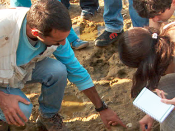Por Friederike Schmid (Institute of Physics, Johannes Gutenberg Universität Mainz, Germany).
Polymeric nanoparticles are of increasing interest in nanotechnology and nanomedicine. One promising approach to preparing nanoparticles in a controlled manner is self-assembly from solution, e.g., in microfluidic devices. Molecular parameter such as the polymer length and architecture as well as process parameters can be used to control the size and shape of the particles. Our goal is to use self-consistent field theory and field-based simulations to investigate important mechanisms underlying this control.
We will first discuss the influence of molecular parameters on the resulting particles, with particular focus on the effect of molecular dispersity. Traditionally, theoretical studies are based on model systems of idealized monodisperse polymers. In reality, however, most synthetic polymers are inherently polydisperse. As we will show, this has a significant and mostly beneficial impact on the size and the dispersity of the nanoparticles. Then we will discuss mechanism of size control by tuning process parameters, for example during nanoparticle synthesis in microfluidic channels.
An efficient method to study such questions is the self-consistent field (SCF) theory and its dynamic counterpart, the dynamic density functional theory (DDFT). Whereas the SCF approach is highly established and has reached a level where it reproduces equilibrium properties of inhomogeneous polymer systems at an almost quantitative level in many cases, the predictions of DDFTs are usually much less accurate. In the last part of the talk, we present a recently developed approach to systematically construct DDFTs from microscopic simulation trajectories, which greatly improves the quality of quantitative predictions from DDFT simulations.
Transmissão via Zoom.







